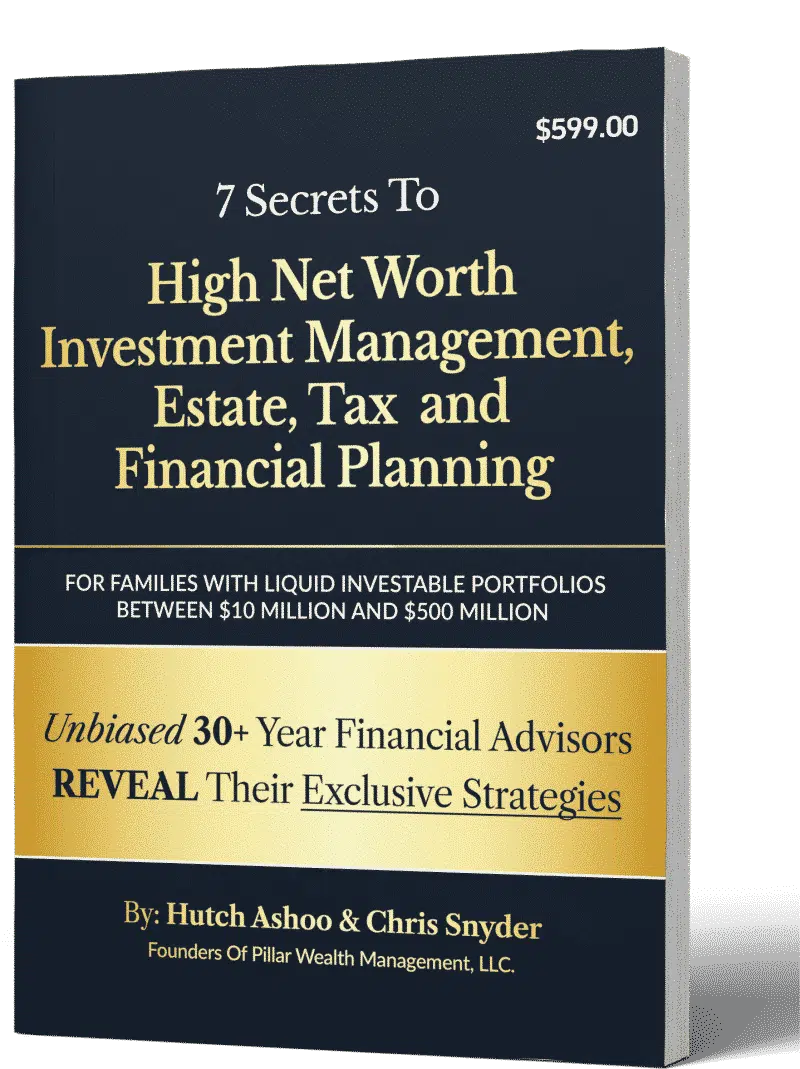Fee Only Certified Financial Planner Near Me – PillarWM
FIND A FINANCIAL FIDUCIARY
There are many types of financial advisors in the industry, but not all of them are suitable for high net worth and ultra-high net worth individuals and families. People who possess $5 million to $500 million in liquid assets have complex financial requirements that call for complex financial plans. This isn’t possible with any type of financial planner. So, rather than searching for just any random financial planner, you need to search for a “fee-only certified financial planner near me.” Read our insightful guide and learn how you can choose a financial advisor that will help you attain your financial goals.

STRATEGIES FOR FAMILIES WORTH $5 MILLION TO $500 MILLION
7 Secrets To High Net Worth Investment Management, Estate, Tax and Financial Planning
The insights you’ll discover from our published book will help you integrate a variety of wealth management tools with financial planning, providing guidance for your future security alongside complex financial strategies, so your human and financial capital will both flourish.
Clients frequently share with us how the knowledge gained from this book helped provide them tremendous clarity, shattering industry-pitched ideologies, while offering insight and direction in making such important financial decisions.
The financial planners at Pillar Wealth Management have more than three decades of combined experience working with high net worth and ultra-high net worth clients. We strive to provide fee-only financial planning services to our clients and ensure that we always prioritize your best interests. To get in touch with our team, click here and schedule a free consultation.
Table of Contents
- What Is a Fee-Only Certified Financial Planner?
- Why Choose a CFP
- What Makes CFP Professionals Different
- How a CFP Professional Can Help You
- How to Find a Good Certified Financial Planner Near Me
- Advantages and Disadvantages of Using a Fee-Only Advisor
- Why High-Net-Worth Investors Should Hire a Fee-Only Certified Financial Planner
- Is A Fee-Only Certified Financial Planner Right for Me?
- How Do I Find s Fee-Only Certified Financial Planner Near Me?
What Is a Fee-Only Certified Financial Planner?
The world of financial planning involves some very confusing terminology including, “fee-only financial planner,” “certified financial planner,” “fiduciary financial planner,” and more. In this section, we’ll take an in-depth look at what it means to be a fee-only certified financial planner.
If a financial advisor or financial planner is fee-only, it means that they receive compensation only from the fees their clients pay them for their services. In other terms, fee-only financial planners do not earn commissions for advising their clients to invest or buy particular financial or investment products. The best thing about a fee-only structure is that it minimizes potential conflicts of interest. At Pillar Wealth Management, we offer 100-percent fee-only financial planning services to wealthy individuals who have liquid assets equivalent to $5 million and more. To get in touch with our team, click here and book a free consultation.
Moreover, a certified financial planner, also known as a CFP, is an individual who has obtained a formal designation from the Certified Financial Planner Board of Standards, Inc. Certified financial planners help their clients in numerous areas of financial management, such as investment planning, insurance planning, tax management, wealth transfer, and retirement income planning. You can get a free hardcover copy of our book, and learn more about the importance of working with a financial advisor.
In conclusion, a fee-only certified financial planner is someone who has a formal designation from the Certified Financial Board of Standards and only charges a fee from their clients in exchange for their services. The common element between a fee-only financial planner and a certified financial planner is that they have a fiduciary responsibility, which means that they have to make decisions that prioritize their client’s best interests.
Why Choose a CFP

You may think that any financial planner must have some sort of certification, only to find out later that it’s not true. Someone may call themselves a financial planner without being certified for anything, which is why having a body like the CFP Board is important; it certifies financial planners who serve the interests of the public. The CFP Board doesn’t specifically promote these professionals’ explicit work, but it certifies that any individual with a CFP® designation has met set educational and professional requirements concerning financial planning. Customers who need reliable and proficient financial advice can rely on this accreditation procedure.
The distinguished group of professionals who hold the CFP® designation is characterized by strong compliance with the exacting requirements of the CFP Board, encompassing extensive training, testing, and ethical standards. They go through a daunting validation procedure that includes postgraduate studies in finance, as well as a tough financial certification examination covering many different areas of finance. This exam evaluates how well the candidate can put to use outside the classroom what they have learned about finance. Passing such a test shows that you know what you’re doing when dealing with other people’s money, proving your trustworthiness.
Other than meeting the academic and exam requirements, the CFPs promise to honor essential moral principles by developing faithfulness and truthfulness in the context of financial planning relationships. Their commitments are substantial; they have to consider their customers first when making decisions while handling confidential financial information.
To become a Certified Financial Planner (CFP) requires having worked for a number of years as a financial consultant. Such practical exposure makes sure that those who are registered as planners have more than just knowledge; they can also apply what they know when dealing with clients’ issues. Thus, in choosing a financial planner, clients are advised to search for this designation as it signifies quality and dependability in financial planning.
What Makes CFP Professionals Different

Opting for a CFP® for your financial planning needs means you would be consulting with an advisor who has demonstrated expertise and promises to observe ethical standards at all times. They have the necessary skills and real-world experience. This thorough preparation is what ensures that CFP® professionals are able to handle the intricacies of financial planning and offer you advice that makes sense based on your financial goals.
In addition, CFP® professionals are dedicated to helping their clients achieve the best outcome in a variety of financial circumstances. Therefore, if you want to retire, need some investing insights, or need help drafting your will, a CFP® is well-equipped to help you. They provide deep insight into financial principles and products, besides the ethical application of such principles with reverence for competence. Choosing a CFP® certified advisor is an indication that you want someone who puts your financial health first and works towards your future objectives.
Education
While their credentials are renewed periodically, certified financial planners have the necessary combination of skills that allow for all-inclusive financial planning, ranging from investments to retirement planning and beyond. They are responsible for maintaining up-to-date knowledge and skills, allowing them to handle their clients’ financial affairs effectively as the financial landscape changes. This criterion emphasizes the CFP’s dedication to continued training as well as keeping up with financial trends and regulations.
Exams
Certified financial planners successfully complete exams that evaluate their capacity to apply financial principles to real-world situations. Administering this test is one way of ensuring that they are competent to help you organize your finances. The test ensures that these experts possess not just knowledge but also the ability to use their knowledge to provide top-quality financial advice that applies to the different financial circumstances and needs of their clients.
Experience
Certified financial planners are required to have at least two years of industry experience as a prerequisite for certification, which allows them to provide financial planning services. This requirement guarantees that they are knowledgeable theoretically and experienced practically enough to deal with actual financial problems. They can handle a wider range of financial planning activities effectively, two of which are wealth management and retirement planning, the result being that they can provide well-informed financial advice that is relevant to real client situations.
Ethics
The Certified Financial Planner Board of Standards, Inc. (CFP Board) establishes and enforces an ethical code and professional standards that govern the member CFPs. Significant disciplinary action can be taken if one fails to adhere to this code and standards. Sanctions could be levied against those members who do not meet these standards, and in some instances, their designation may be revoked entirely. Ensuring that the highest degree of integrity and professionalism is maintained in practice creates a framework for ensuring that the interests of clients are protected and safeguarded by the CFP.
How a CFP Professional Can Help You

Consulting with a CFP means you have a reliable consultant regardless of whether you require advice in a limited way or a comprehensive plan for your economic future. If you work with a financial professional who has the CFP designation, they will provide you with advice specifically for your personal financial situation, providing solutions to your immediate problems as well as strategies for meeting your long-term objectives.
Collaborating with a CFP gives you the confidence to make informed financial decisions today as well as sets the stage for a secure and prosperous tomorrow. These professionals employ methodical and forward-looking financial planning methods that help you deal with any financial problems and opportunities that emerge. When you choose to work with a CFP, you are selecting an advisor dedicated to adhering to the highest standards of proficiency and ethics in financial advisory services.
Retirement Planning
Many individuals aspire to save money for the future, and to do that effectively, they need to plan wisely, thinking about the future. In other words, you have to keep saving and making investments where you can increase your wealth, allowing you to maintain your lifestyle in retirement. Your projected expenses during retirement should be budgeted accurately based on lifestyle choices and personal needs. For retirement to be effective, having enough money during retirement means a lifelong commitment to saving and building wealth. It’s important for your peace of mind, knowing that your future will be comfortable. At some point, saving has to become a priority, preparing for when old age inevitably arrives.
Tax Planning
When you reduce the taxes you are required to pay, you have more money to invest. You can reduce your tax burden through the use of tax-advantaged savings vehicles and available tax incentives, hence increasing investable funds. In addition, you can skillfully manage your income flow as well as the timing of withdrawals to minimize tax. This method helps you pay less tax in the short term and provides a good foundation for the future growth and stability of your finances. Forward-thinking tax preparation is a way to ensure every dollar moves you closer to your financial dreams, and tax planning cannot be excluded from any serious financial plan.
Investing
Making money grow through a variety of investment instruments is smart because it provides a range of opportunities for returns. You can make your money work for you by buying shares, loans for companies that need financing, taking part in different types of pooled funds, and various deals involving real property. While keeping your funds in cash or savings accounts usually brings little returns, strategic investment can substantially increase your assets in the long run. Nonetheless, investing has its dangers, including risking your capital. While the idea of greater returns is attractive, you have to consider the risks involved and find ways to manage these financial uncertainties.
Debt Management
Developing an effective strategy for debt repayment begins with a meticulous review of your financial obligations. Breaking down every debt is the first step, including criteria such as interest rate, terms of repayment, possible tax relief, or any other reason for categorization. An effective tool for managing your debts is to prioritize them so you can concentrate on those that cost the most or on small debts that could be eliminated quickly. This strategic prioritization reduces the total interest paid over time and streamlines the repayment process. By understanding the structure and impact of each debt, you can make informed decisions that optimize your financial resources and expedite your journey toward financial freedom.
Insurance Planning
Insurance acts as a critical safeguard for your assets and income throughout various stages of life, providing essential protection against unforeseen events. When you purchase life insurance, for example, and you die earlier than expected, your family will be able to manage their budget. The importance of disability insurance cannot be downplayed either, considering that you could be sick (or even injured) and unable to meet your obligations. This insurance offers an alternative income source, making it possible to maintain the same lifestyle. Homeowners insurance protects you against loss caused by natural calamities that can devastate homes and is equally important.
A car insurance policy is critical in the event of an accident, helping repair the vehicle and protect you against any legal claim that may arise from a third party. Furthermore, medical insurance is crucial in the treatment of any illness, allowing you to afford necessary treatments without compromising quality. Given the unpredictable events in life, there is a need to ensure financial stability and peace of mind through various forms of insurance coverage.
Estate Planning
If you become unable to make decisions about your money and health, an estate plan is an essential legal entity that clearly identifies who will get your possessions, such as real estate, cash, and other assets, and specifies who will be charged with making any life-changing economic decisions on your behalf.
An estate plan can include healthcare proxies enabling a responsible party to make healthcare decisions for you when you are unable to. A durable power of attorney gives a trusted individual the power to handle your finances if you are incapacitated. In some situations, it might be wise to set up a trust to control what happens to your assets, which can help reduce taxes once you are gone as well as preserve your heritage. Through these documents, estate planning offers a structured approach to safeguarding your assets and ensuring your preferences are honored.
How to Find a Good Certified Financial Planner Near Me

Before you start to look for a financial advisor, you need to educate yourself on the most vital aspects of your finances. Then, you can focus on those advisors who specialize in those critical sectors. You need to understand the cost of having an advisor and how much you’re willing to pay for their services. You’ll also want to thoroughly check their credentials, reviews, and past client experiences.
1. Consider Your Priorities
Nick Bormann, a certified financial planner based in Spokane, Washington, points out that financial advisors often develop specialties based on the types of financial advice they provide or the specific demographics they serve, such as teachers, technology executives, or middle-class individuals nearing retirement. This specialization allows them to offer more tailored advice and solutions that directly address the unique financial challenges and opportunities faced by these groups. Simply put, this knowledge may come in very handy when looking for a financial advisor who not only meets all your standard needs but is also knowledgeable in particular domains significant to your money matters.
When embarking on the quest for a suitable financial planner, it’s crucial to start by clarifying your primary financial needs and objectives. For example, if your goal is to get out of debt or enhance your savings as retirement looms on the horizon, you should look for a planner skilled in adjusting budgets and coaching clients toward sustainable financial habits.
Conversely, if your concern revolves around the adequacy of your accumulated savings to support your lifestyle through retirement, opting for a planner who has a robust background in creating long-term financial projections and is savvy in diversifying retirement investments would be beneficial. This strategic approach ensures that the financial advice you receive is not only expert but also customized to ensure your financial stability and growth.
2. Identify Planners Who Fit Your Needs
The financial advisory landscape can be perplexing with its vast array of titles and certifications, often appearing as a bewildering mix of abbreviated credentials. While many individuals may label themselves financial advisors, discerning the qualifications that truly denote expertise is crucial. There is one sign of quality that is universally recognized, a designation that stands out among others, that is, the CFP (certified financial planner) certification acquired through years of demanding preparation.
Individuals that hold the CFP certification have completed a comprehensive educational program as well as passed a challenging test that assesses their full understanding of finance. When you select a CFP as your advisor you will get advice from someone who has knowledge covering the broadest range of money matters, including investment strategies, retirement planning, tax implications, and estate management.
The CFP designation demands adherence to ethical principles as well as participation in continuing education to ensure that the practitioner keeps pace with developments in the financial sector. When you hire a CFP, you are placing your financial life in the hands of an expert who meets not only these educational requirements but also upholds the highest standards for financial planning.
3. Figure Out the Costs
Fee-only advisors charge for the advice given and for asset management, rather than receive commissions for selling financial products. This fee structure ensures that their recommendations are unbiased and solely in your best interest, as they are not incentivized to promote specific products. Fee-only advisors typically charge clients an annual percentage of the assets under management. This approach aligns the advisor’s financial incentives with your success, as their compensation increases with the growth of your assets.
The rates charged by these advisers usually range from 0.6% to 1.2% of the portfolio size per year. Importantly, the percentage charged often decreases as the account balance grows, making this model particularly advantageous for investors with substantial assets or those with more complex financial situations. This tiered pricing structure rewards asset accumulation with lower relative fees. However, it’s crucial to note that some planners strictly adhere to this percentage-based model and may impose minimum portfolio requirements. As such, they might only accept clients whose financial portfolios meet or exceed a certain threshold, ensuring that the advisory relationship is economically viable for both parties.
4. Vet the Contenders
You’ll want to ensure any potential advisors are certified and up-to-date with current practices. It is also important to investigate them regarding suspensions or other corrective measures against them, including penalties. You can do this by accessing the disclosure system found on the Securities & Exchange Commission (SEC) website to get full details on any past wrongdoings or grievances leveled against the advisors. Ensuring the credibility and integrity of your financial planner through these resources is a foundational step in selecting a trustworthy professional.
Following the initial background checks, the next step involves scheduling consultations with two or three of the most promising candidates. Preferably, these meetings should be conducted in person, as many competent financial advisers offer a complimentary first session. This meeting is an opportunity to assess their familiarity with situations akin to yours and their ability to manage your specific financial needs effectively. During your interaction, ask them to describe how they have handled similar cases, which will provide insight into their practical experience and problem-solving skills.
Given that this could potentially be the beginning of a long-term professional relationship—one that will delve into personal and sensitive financial matters—it is crucial that the planner demonstrates clear communication, attentive listening, and the motivation to keep you committed to your long-term financial objectives.
Advantages and Disadvantages of Using a Fee-Only Advisor
Fee-only advisors do not earn commissions, so they can offer advice that is unbiased and recommend any products they feel are best for the client. They will focus on helping you meet your financial goals. As a result, their financial plans can be more comprehensive. They are not subject to conflicts of interest and should provide unbiased advice.
Moreover, most fee-only advisors are fiduciaries, which means they can focus on meeting your goals, not their own earnings. Their fees are more transparent, so you’re aware of the impact on your returns.
Yet, if the advisor lacks experience or skill, they may not be the best advisor for you. Because they don’t earn commissions, fee-only advisors can be more expensive, and they may not be free to recommend certain products, which means you would have to go elsewhere for that service.

Why High-Net-Worth Investors Should Hire a Fee-Only Certified Financial Planner
There are many types of financial planners in the industry. For instance, there are fee-based financial planners, commission-based financial planners, non-certified financial planners, etc. So, the question that remains is “Why should high-net-worth investors hire a fee-only certified financial planner and not another type of financial planner?” Well, if the same question has been bothering you, then check out the following points.
Fiduciary Services
The best part of working with a fee-only certified financial planner is knowing that they will work in your best interests. Fee-only certified financial planners are there to help grow your wealth and not their own, as they don’t depend on what they sell to you to earn money. They have to work as fiduciaries, which obligates them to always work in your best interests.
Range of Services
Fee-only certified financial planners typically offer a wider range of services to help their clients attain their financial goals. On the contrary, commission-based, non-certified financial planners tend to restrict their services to products that can help them earn the most money. Some common services provided by fee-only certified financial planners include:
– Investment Management
– Retirement Income Planning
– Cash Flow Planning
Investment Management
Many affluent families invest a large percentage of their wealth in bonds and stocks. This isn’t because of any personal preference but only due to the fact that they don’t have a lot of information regarding other profitable investment opportunities.
If your assets are also in the form of bonds and stocks, you should hire a fee-only certified financial planner who can advise you regarding the best investment options available to grow your wealth. For instance, collectibles (classic luxury cars, gold, artwork, etc.), real estate, hedge funds, and private equity are all high-return investments.
Working with a fee-only certified financial planner will inform you about where you should invest your wealth for maximum gains. Our qualified, fee-only financial planners at Pillar Wealth Management will thoroughly evaluate your portfolio. Based on your financial objectives, current economic circumstances, time horizons, and risk aversion, we will develop plans to make sure you earn a maximum level of returns.
Thus, if you lack the time, resources, knowledge, and skill to stay abreast of ever-changing market movements, you should hire a fee-only financial advisor who can give you unbiased investment advice.
Retirement Income Planning
Retirement income planning is inarguably one of the most important services offered by a high-net-worth fee-only certified financial planner. A fee-only certified financial planner will ensure that a well-thought-out retirement plan is incorporated into your overall financial plan. Such a retirement plan will include the financial goals you want to achieve post-retirement and the steps you need to take to reach them.
With a fee-only certified financial planner working with you, you can be assured that you’ll have access to an adequate income stream even after you retire to live a worry-free and peaceful retirement. Plus, if you have any new post-retirement financial objectives, such as purchasing a luxury yacht, we will systematically work out your future cash flows and suggest ways in which you can attain them.
Cash Flow Planning
Proper handling of your wealth and assets can ensure you attain your financial goals and ultimately reach financial serenity. Cash flow planning is important for setting up and maintaining an emergency fund to avoid problems if unaccounted expenses arise.
At Pillar Wealth Management, our financial planners are highly skilled at curating cash flow management plans. We will identify your income sources and assess how you’re spending your money, along with calculating your liabilities and assets, to determine how your cash flow can be optimized. Using our fee-only services, you can make intelligent decisions regarding your assets and wealth, foresee any future cash-flow problems, and take steps to overcome them.
Is A Fee-Only Certified Financial Planner Right for Me?

Are you still confused about hiring a financial planner and are thinking, “Is a fee-only certified financial planner right for me?” Here’s a list of benefits of working with a fee-only certified financial planner.
Knowledge, Skills, and Expertise
Fee-only certified financial planners are highly skilled in managing the finances of wealthy clients. They have in-depth knowledge of the various investment and financial products available and closely track market trends to immediately capitalize on any profitable opportunity.
Plus, you may even have access to historical economic data, which is essential in formulating financial strategies. Our fee-only financial planners at Pillar Wealth Management have rich financial data that dates back nearly a century. We use insights from this data to prepare financial plans that will help you accomplish your financial goals.
Tailored Financial Solutions
A fee-only certified financial planner is right for you because they offer tailored financial solutions, unlike other major financial institutions. So, if you want financial strategies that are specially designed with your goals and interests in mind, a fee-only certified financial planner is right for you.
At Pillar Wealth Management, we take pride in the tailored financial plans we provide to our valued clientele. In fact, this year, we took on only 17 new clients so that we could build unique financial plans for each one. Click here to speak to one of our financial planners and start working on your own tailored financial strategy.
How Do I Find s Fee-Only Certified Financial Planner Near Me?

If you’re now convinced you should hire a financial planner, you might be wondering, “How do I find a fee-only certified financial planner?” Well, the process is quite simple and straightforward—all you have to do is follow the guidelines below. You can also read our free guide here and learn how you can choose the best financial planner for you.
When the time comes to find a financial advisor or a financial planner, the best place to start is to ask your close friends, family members, and colleagues. Talk to those whose financial circumstances are similar to yours. That way, they can refer to a fee-only certified financial planner suitable for you.
After you have narrowed down your list of potential financial planners, you need to do extensive research and identify which one suits your needs in the best way. One way to research your shortlisted financial planner is to look them up on LinkedIn. Any guides, books, or blogs that the financial planner has written also add to their credibility.
You should set up a preliminary meeting with a few financial planners before you sign any kind of contract. Financial planners usually don’t charge for this. You should use this opportunity to put forward key questions related to financial planning. You can ask them about their educational qualifications, experience in the industry, clientele, specialty, services provided, and anything else you feel is relevant. We highly recommend you read our guide for investors with $10 million and more to find additional questions that you can ask a financial planner.
Remember that financial planning is a personal process that encompasses all aspects of your life. Thus, you need to be able to fully trust the person you work with. If you feel that something’s not up to the mark, you shouldn’t hesitate to find a new advisor.
A Few Last Words
A good financial planner can be the difference between increasing your wealth sustainably for decades and losing all your wealth before you make it to retirement. So, make sure you use the services of a reliable and trustworthy fee-only certified financial planner. You can click here to arrange a free consultation session with us, and one of our team members will be in touch with you!
To be 100% transparent, we published this page to help filter through the mass influx of prospects, who come to us through our website and referrals, to gain only a handful of the right types of new clients who wish to engage us.
We enjoy working with high net worth and ultra-high net worth investors and families who want what we call financial serenity – the feeling that comes when you know your finances and the lifestyle you desire have been secured for life, and that you don’t have to do any of the work to manage and maintain it because you hired a trusted advisor to take care of everything.
Related Post
- Financial Planning For High Networth Individuals – The elite class has specific and unique financial requirements and needs when it comes…
- Wealth Management Davie – Managing the wealth of high net worth individuals requires a different set of skills…
- Best Fee Only Financial Advisors Near Me – When you decide to get financial advice, there are many aspects you need to consider as a high net worth investor…
- Retirement Financial Advisor Near Me – If your liquid assets are worth more than $10 million, you can’t afford to undermine the importance of retirement planning…






















































